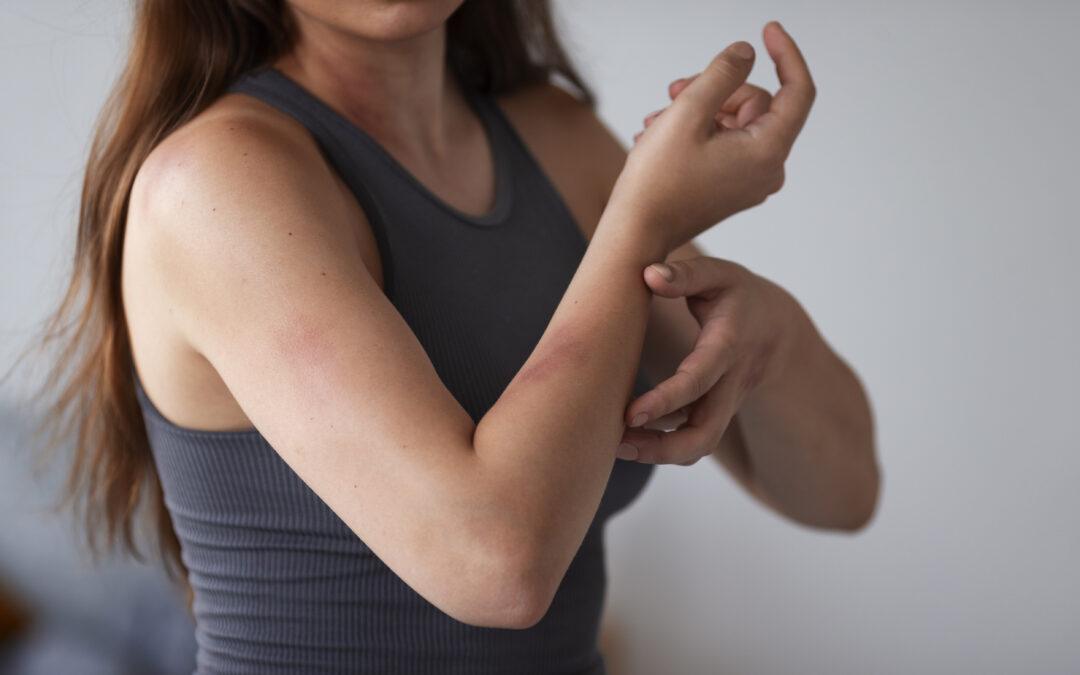Aside from the hands, the arms are the most exposed parts of the body. If you have eczema on your arms, it’s very visible and easy to scratch when it becomes itchy. Most of the irritation can be seen at the folds of the arms, just above the elbow. The skin on this part is thin and sensitive, and the creases gather the most irritants, which can cause redness and itchiness. Sometimes, it can even bleed due to excessive scratching.
To prevent that from happening or to stop the triggers, here are some of the things you should avoid getting in contact with:
1. Avoid wool and synthetic fabrics
Some textiles and fabrics are irritating to the skin. Wool is rough and prickly to the touch. Synthetic fabrics, such as polyester and nylon, are harsh and irritating to the skin. These can even make you sweat. Prevent using these types of fabrics for clothes or bedding.
Instead: It is more advisable to choose loose and breathable cotton-made clothes and fabrics for people with atopic dermatitis on the arms or anywhere on the body.
2. Be careful when you use perfume and cologne
When you spray perfume or put cologne on, you may be getting some on your exposed body parts. There are chemicals in these fragrances that can cause more harm than good if you have eczema on your arms. Even a small droplet can make your skin burn and itch.
Instead: Look for all-natural and hypoallergenic perfumes and colognes. Do a patch test before purchasing to make sure it’s good for you. You don’t need strong fragrances. Mild ones work well for your skin condition.
3. Stay away from harsh soap and bubble bath
Bubble bath liquids and bath bombs contain strong fragrances and harsh chemicals that make them extra soapy. The bubbles and suds wash away the protective skin barrier and can worsen the eczema on your arms and the rest of your body. This is the same as taking a bath with scented soap. These can all harm the skin and cause further irritation.
Instead: Choose milder soaps and refrain from soaking in bubble baths.
4. Be protected from pollen, mold, and dust
Pollen from flowers, mold and mildew, and dust particles are the most common allergens. These are microscopic, and you will never know if they are in the things you touch, the food you eat, or even the air you breathe. They can cause redness, itchiness, and irritation.
Instead: Dust and vacuum your home regularly. Change pillowcases and mattress covers every once in a while. Wash your beddings properly in hot water. If possible, remove sources of allergens such as curtains and carpets.
5. Avoid sweating
There is nothing wrong with working out. It makes you healthy and relieves stress. However, the sweating part is not good if you have eczema on your arms or anywhere in your body. Sweat can worsen your skin condition and cause itchiness.
Instead: You can still exercise but there are things you need to watch out for. Do it indoors or in any cool area. Do not work out in hot weather. If you can’t get rid of the sweat coming out, dab your skin with a towel. Take breaks in between to make sure you don’t get too sweaty. In any case, you can just avoid any activity that can make you sweat. Make sure you stay in well-ventilated rooms that will cool your skin down.
6. Refrain from using hot water
Some people with eczema on their arms or bodies claim that taking a bath with hot water can relieve itchiness. This is only temporary. The truth is, hot water can worsen your skin condition. It can aggravate the symptoms because hot water can make your skin dry.
Instead: If you want the feel of hot water without the drying effects, you can opt for warm water. It helps calm your skin and absorb moisture. After a warm bath, dab your skin with a towel and put on your mild lotion.
Final Thoughts
These are just some of the things you have to avoid if you have eczema on your arms. It can have as many on your list, depending on your triggers. For your comfort and the improvement of your skin condition, it is best if you can keep away from these things because they are within your reach. Some are even unavoidable. Whatever your decision, don’t forget to still consult your doctor to get a proper diagnosis and treatment.
Ready for clearer, healthier skin? Install the NALA app now and start your journey to better skin.


